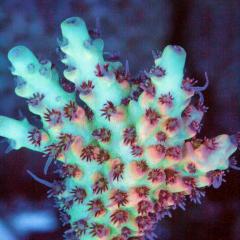Found this very interesting article
So just want to share with everyone here
Problems with Calcium and Alkalinity in a Marine Tank
Many Aquarist struggle with the proper balancing of Calcium and Alkalinity in their reef tanks. Many have high Calcium levels and low Alkalinity levels, while others have the reverse. Others have high or low levels of both. They visit their local store, surf the web, and find supplements, additives, and cure-alls, only to treat their tanks with the wrong products or the wrong methods. Frustration creeps in when the tank doesn't respond to all the different treatments used. What's the best treatments and methods for each specific problem? The answers are easier than you would think, provided you start with a basic understanding of Calcium and Alkalinity.
Coral and other organisms deposit calcium carbonate in their skeletons. In order to accomplish this, they must generate calcium and carbonate at the surface of a growing calcium carbonate crystal. Skipping over the complexities of this process, we can safely conclude that corals are pulling these elements out of the water, and the waterÕs supply of calcium and carbonates needs replenishing. A good range for Calcium is 380- 450 ppm and for Alkalinity 7-11dKH (120-200 ppm). A broad range is used because of the balance between Calcium and Alkalinity. Calcium can be near the top of the range while Alkalinity might remain near the middle or the lower part of the range and visa versa. The broad range allows for a flexible, safe balance between the two elements.
Why test for Alkalinity (carbonate hardness) when corals are using carbonates? Why not test for carbonates? First, some corals use bicarbonates instead of carbonates. Second, testing for both carbonate and bicarbonates is a long and complicated test and very impractical. Third, Alkalinity is comprised of carbonates and bicarbonates, and can be used as a surrogate test for these elements. Alkalinity is a much easier test and can give accurate results. Keep in mind that errors in test kits or those doing the testing can give inaccurate readings. It's best to purchase multiple kits made by different companies in order to verify the results of each test.
Something to keep in mind: Borate. Borate appears naturally in sea water and will probably be present in salt mixes bought for your tank. Excessive amounts of borate added to salt mixes will contribute to a significant portion of your tank's alkalinity. This will give you an Alkalinity reading that doesn't reflect the true amount of carbonate and bicarbonate in the water. It's best to use salt mixes that better mimic the qualities of sea water. Mixes with normal amounts of Borate like Marine Enterprises' Marine Mix. Some companies intentionally or unintentionally add Borate to their salt mixes, adding more than 10 times the natural amount.
How do I correct an imbalance? For tanks with high Calcium and high Alkalinity readings, the best solution is to leave the tank alone. The corals and coralline algae will gradually process calcium carbonate and lower both levels. Keep in mind that if the levels are not monitored while they drop, the Calcium and Alkalinity will dip below the recommended range.
For tanks with both low Calcium and low Alkalinity, a balanced two-part supplement will effectively raise both elements. Tech CB by Kent is a good choice. Lime water (Kalkwasser), a calcium carbonate/carbon dioxide reactor, and other two-part supplements will work well. Adding Calcium and Alkalinity separately will also work but you must fine tune an exact dosage of each. This is done with calcium chloride and sodium bicarbonate. For the regular Aquarist, two-part supplements are safer and easier to use.
Not gaining results from two-part supplements? Measure the Magnesium level in your tank. Magnesium plays a significant role in preventing the abiotic precipitation of calcium carbonate. If your Magnesium is low, you'll likely see a calcium build-up and Alkalinity loss. For a healthy tank, keep Magnesium at 1300ppm.
Tanks with low Calcium and high Alkalinity need a different solution. More accurately, the Calcium is low relative to Alkalinity. Calcium might be in the safe range but it is almost always low. Sometimes this is caused when Aquarist use an Alkalinity buffer to raise the pH. If alkalinity in the tank is already high, then the buffer will make your high Alkalinity even higher. Alternative solutions to pH problems must be pursued at this point; another topic for another article. The solution would be to add a Calcium Chloride supplement like Blue Life or Liquid Calcium. Don't add Alkalinity, Lime water (Kalkwasser), or a Calcium Carbonate/Carbon Dioxide Reactor.
As for tanks with low Alkalinity relative to Calcium, the opposite must be done by adding Alkalinity and no Calcium. Seachem's Reef Builder and Reef Carbonate, and Kent's Pro Buffer dKH and Superbuffer dKH will work to raise the Alkalinity.
Keep in mind that drops in alkalinity come mainly from the precipitation of calcium carbonate processed by corals. Still, partial cycling of nitrogen and the incorporation of magnesium in calcium carbonate might lower alkalinity too. Although precipitation causes most alkalinity problems, these other two minor problems shouldn't be ruled out.
The Calcium/ Alkalinity balance can be achieved. Through proper care, testing, and product knowledge, soon your reef can become a stable ecosystem.



